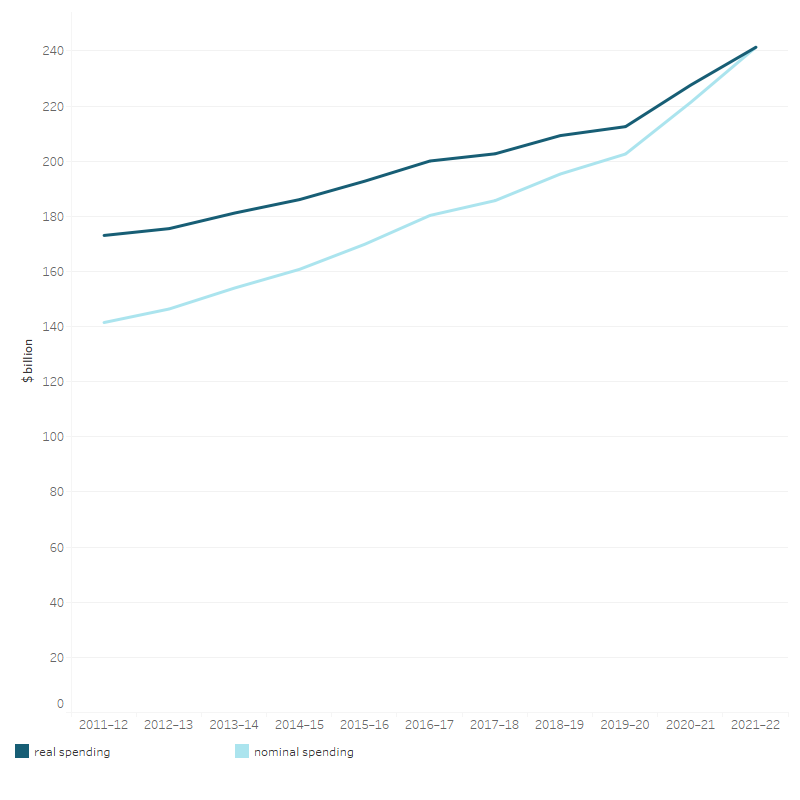Total health spending
Estimates for total health spending capture the national aggregate of all spending on health goods and services for recurrent and capital purposes.
In 2021–22, Australia spent an estimated $241.3 billion on health. In real terms, this represented a 6.0% growth in spending from 2020–21, equating to an additional $13.7 billion (Figure 1a). While the growth was higher than the average over the decade from 2011–12 (3.4%), the 2021–22 value was broadly consistent with the longer-term trend. This suggests a ‘continued rebound’ in health spending since 2020–21 following a low growth during the early stages of the pandemic associated with activity restrictions in 2019–20 (Figure 1b). While the overall amount of spending might appear similar to previous trends, there were some signs of the pandemic impacting on the type of spending, particularly through COVID-19 vaccines and the government COVID-19 response funding arrangements.
Figure 1a: Nominal (a) and real (b) total health expenditure, 2011–12 to 2021–22
The line graph shows that total health spending in both current and constant prices increased each year from 2011–12 to 2021–22. Total health spending in current prices increased from $141.5 billion in 2011–12 to $241.3 billion in 2021–22. In the same period, total health spending in constant prices increased from $173 billion to $241.3 billion.

(a) Nominal spending refers to spending not adjusted for inflation from one year to another year.
(b) Real spending refers to spending accounted for inflation by removing the effect of changes in prices over year. Real health spending is in 2021–22 prices.
Source: AIHW Health Expenditure Database (Table 1).
Figure 1b: Total health spending, constant prices, during the COVID-19 pandemic (2019–20 to 2021–22) compared with the pre-pandemic period
The line graph shows the total health spending, in the three years during the COVID-19 pandemic (2019–20 to 2021–22) compared to the trend of the previous 10-year period (2008–09 to 2018–19). Assuming the average growth rate for the previous 10-year period remains the same for 2019–20 and 2021–22, the trend amounts of total health spending in constant prices for 2019–20, 2020–21 and 2021–22 were $216.7 billion, $224.4 billion, and $232.3 billion respectively. While the actual amounts for these years were $212.5 billion, $227.6 billion and $241.3 billion, respectively.

Notes:
- Actual amount is the health spending in 2021–22 prices.
- Trend amount refers to the heath spending in 2021–22 prices, following the trend of the previous 10-year period (assuming the average annual growth rate for the previous 10-year period remains the same for the period from 2019–20 to 2021–22).
Source: AIHW Health Expenditure Database (Table 1).
Government’s COVID-19 Health Response
Following the beginning of the Novel Coronavirus (COVID-19) pandemic in late February 2020, the Australian Government entered a National Partnership Agreement — the National Partnership on COVID-19 response (NPCR) with state and territory governments. This agreement aims to provide financial assistance for the additional costs incurred by state and territory health services in responding to the COVID-19 outbreak, and efforts to minimise the spread of COVID-19 in the Australian community.
This agreement has three funding arrangements in 2021–22: (1) Hospital Services Payments, (2) State Public Health Payments, and (3) Private Hospital Financial Viability Payment.
In addition, governments implemented a range of policies and programs in response to the COVID-19 pandemic, including referred and unreferred medical services through MBS telehealth, mental health programs, public health mainly related to primary care respiratory clinics, COVID-19 testings and vaccinations (outside the NPCR), MBS-funded COVID-testing, distribution of masks and personal protective equipment (PPE) to health systems.
The main areas in which spending increased were:
- primary health care, by $8.3 billion (10.9% increase)
- hospitals, by $4.2 billion (4.6% increase)
- other services, by $1.3 billion (7.9% increase)
- referred medical services, by $0.4 billion (1.7% increase)
- research, by 0.3 billion (3.7% increase) (tables A5 and A6).
Find out more at:
Table A6: Total health expenditure, constant prices, by area of expenditure and source of funds, 2021–22 ($ million) (XLS 14KB)


